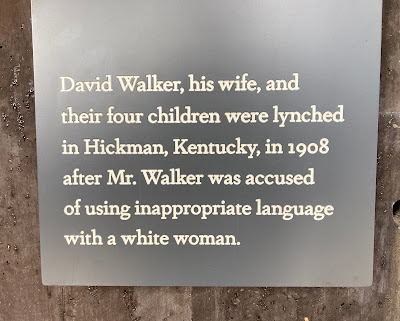I've always avoided Alabama. Visions of Bull Connor and his attack
dogs were enough to keep me away. Then I learned about a new museum in Montgomery honoring the millions Americans enslaved and the protesters Connor's dogs were tearing into. A friend who had visited told my wife and I, "It's a powerful gut-wrenching experience, you really should go". So last week we went taking two neighbors with us.
We spent two days touring the National Lynching Memorial and the Legacy Museum. Both were incredible. We hope you can go there as well.
They opened in 2018 to share slavery's 400-year-old story.  The Legacy Museum uses high-end technology to tell how twelve million Africans were kidnapped to provide free labor for Americans. That led to eras of mass lynchings, racial segregation, and mass incarceration. We saw how these evil pieces fit in our nation's history as never before.
The Legacy Museum uses high-end technology to tell how twelve million Africans were kidnapped to provide free labor for Americans. That led to eras of mass lynchings, racial segregation, and mass incarceration. We saw how these evil pieces fit in our nation's history as never before.
In the museum you visit the enslaved imprisoned, view numerous films, and get face-to-face with the incarcerated. Taking it all in took many quiet hours. No one was staring at their cell phones.
The National Memorial for Peace and Justice (often referred to as "The Lynching Memorial") is dedicated to the thousands of racial terror lynchings that took place between 1877 and 1950.
Memorials nearby honors victims from before and after that time period.
At the site's center hang over 800 steel monuments, one for every county in our country where documented lynchings took place. They reminded me of rusting coffins.
The names of over 4000 African American men, women, and children are carved
into their surfaces. I grew up in Miami-Dade County where four lynchings took place.
There were 18 listed in my current home, Alachua County. Of Florida's 67 county's, 42 had documented racial terror lynchings.
 |
The term, "lynching", is used to designate anyone who was hung, shot, burned, choked ( "George Floyd") or drowned because they were black. The killings needed no reasons. If you were black you could die because you voted, said "Yes" instead of "Yes sir" or if you failed to tip your hat.
Emmett Till, fourteen, was tortured and killed in 1955 because he whistled at a white woman.
 |
The memorial is a quiet, sacred space to experience the truth of our past,
It was created by the Equal Justice Initiative, a Montgomery-based non-profit that is committed to challenging racial and economic injustice. It was founded in 1989 by attorney Bryan Stevenson. Their website has a wealth of information, https://eji.org .
We spoke with one of the helpful docents at the memorial. He reminded us that the 4000+ remembered there are only the documented lynchings, the "names that are known".
"There's got to be 100,000 more", he told us. "My father's six brothers disappeared after WWll. It's not documented, they're just gone."
He pointed out that Alabama is still fighting the Civil War. Although he works in the state's second most visited tourist site, the governor -whose office is just five blocks away- has not taken the time to visit. "She says she'll never come", he added.
At the bottom of the memorial's hill is a grouping of markers. They designate the lynching counties that have made
significant progress in recognizing past transgressions and are engaged in the long reconciliation process. My county, "Alachua", is the only one in Florida that has taken this step.
On the third day we headed home.
Traveling south the four of us shared the lessons learned in Montgomery. Hopefully they will make us better people and more prepared to help rectify the wrongs of the past.
_____________________________________
_____________________________________
_____________________________________
_____________________________________
-Link to 4-minute museum video:
https://www.youtube.com/watch?v=GEXTR5rOpDI
-Link to lynching memorial video:
https://www.youtube.com/watch?v=1PxAcnfrMow
______________________________________
GETTING THERE
Montgomery is a 6-hour drive from Gainesville. We stayed at an Air BnB in the historic Cottage Hill neighborhood.
Our location allowed us to easily walk to the memorial, museum and restaurants.
After driving three hours south we went underground in Florida Caverns State Park. That's another story.
____________________________________________













No comments:
Post a Comment